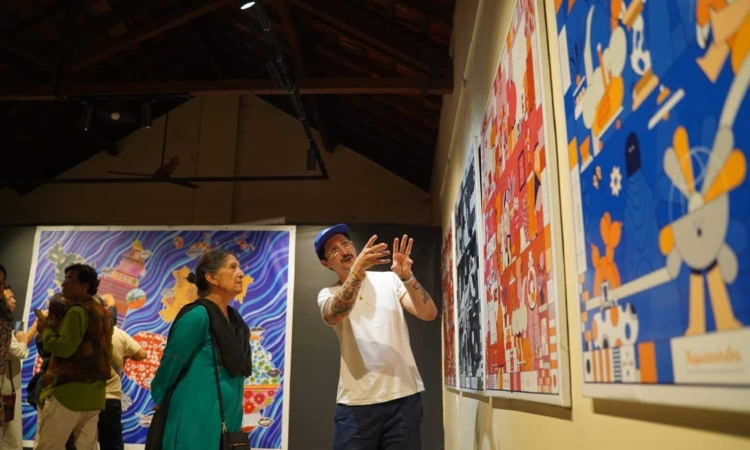Immerse yourself in French artist Aurélien's augmented reality exhibition in Chennai
An international celebration of digital art and technology, titled Novembre Numérique, opened its doors to visitors in Chennai.

French artist Aurélien Jeanney at his Looki Look exhibition
CHENNAI: Ten years ago, a Swiss science fiction museum had invited French artist Aurélien Jeanney to create a whole collection of illustrations and posters on the books of Jules Verne. They wanted him to create an immersive exhibition for children on the world of Verne. The idea was to get children to play with augmented reality and illustrations, so that they could immerse themselves in the author’s books.
“After this exhibition, I decided to make more and more projects with this technology. And here I am today,10 years later!” Aurélien narrates.
An international celebration of digital art and technology, titled Novembre Numérique, opened its doors to visitors in Chennai. Organised by the French Institute in India and Alliance Française Network, the key highlights included the Looki Look exhibition by Aurélien.
Aurélien Jeanney talks to us about the usage of AR in art, the disadvantages of AI in today’s world, his love for India, and so much more.
Aurélien Jeanney's illustration works
Excerpts from the interview:
Could you tell us a little about your journey into the realm of digital art?
I’m a multidisciplinary artist based in Paris, France. For almost sixteen years, I have tried to explore bridges between tangible (prints, objects, paintings, books, etc) and digital (motion, AR, video games, etc). I also run a publishing house and used to showcase other artist’s artworks in my own illustration gallery in Paris called Maison Tangible.
As we hear a lot about AI taking over various aspects of creative businesses. What is your take on the same? How do you think this aspect can affect the genre of work you do?
The issues surrounding AI are far too vast to be answered in a single question. But there are two things to understand about it. The first is that AI is based primarily on the creation of a huge database, which in the case of artists means the outright theft of their works.
But today, the monster is so big that trying to fight against this theft is totally pointless. We need to try to understand how AI works and try to work with it for experiments. Thousands of opportunists are already using this to create works from scratch based on stealing the work of other artists and selling them, having no artistic practice themselves. But that’s the game of an ultra-liberal, connected capitalist world. You can shout about it. Or on the contrary, we can tell ourselves that real artists will always be one step ahead: poetry and reflection!
Aurélien Jeanney's illustration works
Could you elucidate a little about your exhibition Looki Look? What kind of work process did you go through in order to put out your works?
Looki look is a look and find game working with augmented reality. It’s pretty simple to play- you have to find hidden objects in ten posters with your phone and a free augmented reality app. Some of them are very easy to find (even without a phone) but some are very hard. Because everything is moving, all these little worlds come to life on your phone. Good luck in finding all the 120 objects! I always start working on my sketchbook. It’s a big part of my process. Then I can vectorise all my illustrations on my laptop, on Adobe Illustrator. And at the end of the process I try to make some animation loops on After Effects.
Aurélien Jeanney
Your works can be brought to life using the Maison Tangible App. Can you tell us what exactly is this technology and how do you think it will work for the viewers of art?
The principle behind this technology is extremely simple: you can add digital content to the real world through the screen of a phone or tablet. In my case, it allows the viewer of an exhibition to become a player in the exhibition. It makes everything more immersive!
French artist Aurélien Jeanney at his Looki Look exhibition
We have heard that your digital artworks revolve around unique stories from captivating scenes, from an Indian flower market to a temple. Can you highlight a little more about the other aspects of India that you have explored through your digital works? How did you go about with this exploration?
I came to India last year and had the great opportunity to visit several cities such as Ahmedabad, Pune, Bangalore, and Kolkata among others. And my trip inspired me a lot by all the colours I’ve seen back there. Colours, food, smells, auto rickshaws, people celebrating deepavali, etc. It was amazing. I took quite a few pictures and videos.
So when Alliance Française invited me again to showcase my whole new project (it was just its beginning at that time), I jumped on the occasion to create two posters specifically about India- the Hindu temple and the flower market.
The Hindu temple was very important to me because as a tourist, that’s the most beautiful thing you can see in India. When you discover India, you can see so many different temples, colored ones, white ones, with a lot of flowers, candles or statues on them. It’s like you’re in a movie and everything you see is amazing. So I tried to mix some of my favorites into this one.
The flower market is inspired by Bangalore. It was stunning to see so many colours and smell in the same place. I had to represent it into a poster.
—Looki Look is open till March 2025, between 10 am to 6 pm at Alliance Française of Madras.
French artist Aurélien Jeanney at his Looki Look exhibition



